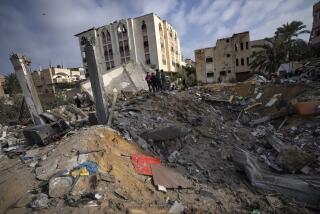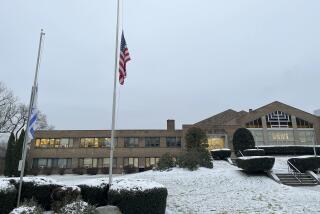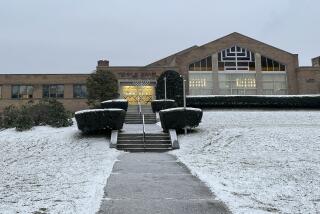Jerusalem synagogue attack: ‘Lone wolf’ pattern seen in deadly assault
In the pious Har Nof neighborhood in the hills of West Jerusalem, early-morning prayers at a landmark synagogue are an integral part of the rhythm of daily religious life. Those who chose that time and place to strike seemed to know that.
Two attackers brandishing weapons including a handgun and a meat cleaver burst into the synagogue early Tuesday, killing four worshipers — three of them with American citizenship, including a prominent rabbi, and the fourth a British national. As police officers converged on the scene within minutes, the assailants shot at least one of them before being slain. The officer later died, Israeli media reported.
The assailants were identified as Palestinian cousins from predominantly Arab East Jerusalem, a site of violence in recent months.
Prime Minister Benjamin Netanyahu, describing the attackers as “animals,” vowed a harsh response to the killings, which he blamed on Palestinian incitement. The assault horrified Israelis, drew international condemnation and threatened to further inflame Jewish-Muslim tensions, which were already running high over a contested holy site in Jerusalem.
At least seven Israelis remained hospitalized in the wake of the attack, the deadliest in Jerusalem since 2008.
President Obama condemned the assault, saying “it is all the more important for Israeli and Palestinian leaders and ordinary citizens to work cooperatively together to lower tensions, reject violence and seek a path forward towards peace.”
The White House identified the slain Americans as Aryeh Kupinsky, Cary William Levine and Moshe Twersky, the latter a member of a noted Hasidic dynasty. Israeli news reports identified all four of the slain worshipers as rabbis, and the FBI said it was working in “close collaboration” with Israeli authorities on the case, given that three of the victims were U.S. citizens.
Tuesday’s violence appeared to fit a pattern of recent “lone wolf” attacks by Palestinians in part embittered by the dispute over the holy site, though it was somewhat more sophisticated and carried out by two people. Israeli officials have not suggested that the assaults were orchestrated by any particular group, but they have accused Palestinian leaders and media of encouraging the anger.
The men who carried out Tuesday’s attack, identified by authorities as Udai Abu Jamal and Ghassan Abu Jamal, “have no previous security records and did not operate within the framework of any organization,” Yoram Cohen, head of the domestic intelligence agency Shin Bet, told members of a parliamentary committee after the incident, the newspaper Haaretz reported.
Witnesses described panic and pandemonium during the storming of the synagogue, with the dead and wounded crumpling to the floor, still clutching sacred texts. A 12-year-old boy whose father was seriously wounded crawled on the bloodied floor to escape and summon help.
For many Israelis, the specter of a calculated strike against Jews at prayer, in ritual garments, carried chilling overtones of historic persecution.
“Jewish worshipers lay dead in pools of blood, still wrapped in prayer shawls and phylacteries, with holy books strewn on the floor,” Yehuda Meshi-Zahav, who heads Zaka, an emergency response group led by Orthodox Jews, told Israel Radio. “Such sights I have never seen — they recall dark days.”
Witness Yaacov Amos said the attack came in the midst of the Shemoneh Esrei, the prayer that lies at the heart of the Jewish liturgy.
“I suddenly heard shots,” said Amos, 45, who said he took cover behind a lectern. “The shock was not to be believed — in the middle of this prayer, of all prayers, here in our synagogue, before my very eyes, at a range of zero.”
U.S. Secretary of State John F. Kerry called Netanyahu and expressed his condolences. “This simply has no place in human behavior,” Kerry told reporters in London.
Netanyahu, who summoned top security officials to an emergency meeting, said the “despicable murderers” would not go unpunished. Within hours of the attack, a massive police contingent raided the family homes of the two assailants and arrested more than a dozen family members, according to Palestinian accounts.
The Israeli leader said the attackers’ homes would be demolished — a practice largely abandoned in recent years — and “inciters” held to account.
A government statement said unspecified “additional decisions … have been made in order to strengthen security throughout the country.” Israel had already redeployed hundreds of troops to the West Bank after a pair of lethal stabbings last week.
After Tuesday’s attack, Israeli forces in East Jerusalem and several parts of the West Bank battled stone-throwing protesters, clashes that continued as night fell. A light-rail train passing through an Arab neighborhood of Jerusalem was pelted with rocks and forced out of service.
At Kerry’s prompting, Palestinian Authority President Mahmoud Abbas issued a denunciation of the attack, but he coupled it with a call for a halt to Israeli “intrusions” on a site in Jerusalem’s walled Old City that is revered by Jews as the Temple Mount and Muslims as the Noble Sanctuary.
The militant movement Hamas praised the attack but did not claim involvement. Celebratory gunfire rang out in the Hamas-dominated Gaza Strip and at several locations in the West Bank, and a group spokesman, Sami abu Zuhri, called the assault a response to the “continuing crimes of the occupation.”
Police spokesman Micky Rosenfeld told reporters in a conference call that allegations by some neighborhood residents that the attackers had worked in a shop near the synagogue had not been confirmed, but authorities were investigating the assailants’ ties to the Har Nof area. Palestinians with Jerusalem IDs often work in the city’s western neighborhoods.
The brutal nature of the attack, the shock of a strike on a house of prayer, and the fact that the assault took place in a part of Jerusalem considered far removed from recent clashes, boded ill for any calming of the violence that has roiled the city in recent months.
Four people on the Israeli side of the city have been killed in the last month in vehicular attacks by Palestinians, and in a spreading of “lone wolf” attacks outside the city, a soldier last week was fatally stabbed in Tel Aviv, as was a Jewish woman outside a West Bank settlement bloc.
Netanyahu this week blamed Palestinian leaders for inciting such attacks, telling Israelis in a nationally televised appearance that “Hamas, the Palestinian Authority and others spread libel and lies against the people of Israel every day.”
Much of the current burst of ill feeling is centered on the Temple Mount/Noble Sanctuary. Jews are allowed to visit the hilltop site but not pray there, and activists — some from within Netanyahu’s government — have been calling for a change to that long-standing “status quo,” infuriating Muslims across the Islamic world.
Kerry visited Jordan, the formal custodian of the site, last week to try to ease frictions, winning pledges for calming measures from both Netanyahu and Abbas in separate meetings. But calls for moderation are likely to be lost in the outcry over the attack, and any retaliatory strikes arising from it.
“We’re at war,” Israeli lawmaker Aryeh Deri, who comes from the neighborhood where the attack took place, told Israeli radio.
Neighbors and relatives of the attackers described them as heroes of the Palestinian cause.
Palestinian media depicted the synagogue attack as retaliation, coming after an Arab bus driver was found hanged Monday at a bus depot in West Jerusalem. A forensic report ruled that there was no sign of foul play and that the death was a suicide, but Palestinian media reports sharply contested the impartiality of the examiners.
Tuesday’s assault was the most lethal in Jerusalem in six years, since a gunman attacked a yeshiva on the city’s outskirts, killing eight of the religious students. An off-duty army officer killed that attacker.
Sobelman is a special correspondent and King a Times staff writer. Special correspondents Maher Abukhater in Ramallah, West Bank, and Tami Zer in Jerusalem contributed to this report.
Twitter: @laurakingLAT
More to Read
Start your day right
Sign up for Essential California for news, features and recommendations from the L.A. Times and beyond in your inbox six days a week.
You may occasionally receive promotional content from the Los Angeles Times.






